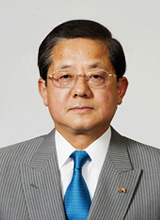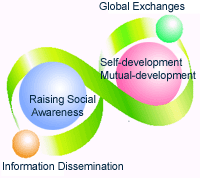Message from Koei Tsuge, Chairman of EPOC
 The Environmental Partnership Organizing Club (EPOC) is a group that was established in February 2000 mainly by the industry sector in the Chubu region. EPOC seeks to bring together companies, organizations, and so on that are passionate about environmental activities, and to contribute to sustainable economic development in Japan by carrying out research, exchanges, implementation, and information dissemination with regard to activities for the reduction of environmental impact and so on, beyond the boundaries of industry and business categories.
The Environmental Partnership Organizing Club (EPOC) is a group that was established in February 2000 mainly by the industry sector in the Chubu region. EPOC seeks to bring together companies, organizations, and so on that are passionate about environmental activities, and to contribute to sustainable economic development in Japan by carrying out research, exchanges, implementation, and information dissemination with regard to activities for the reduction of environmental impact and so on, beyond the boundaries of industry and business categories.
Since the establishment of EPOC, we have been carrying out a wide range of activities and implementing initiatives aimed at building a recycling-oriented economic society. This has included providing information that contributes to environmental management; conducting surveys on advanced examples of recycling-oriented societies, low-carbon societies, and environmentally symbiotic societies; and raising the environmental awareness of the next generation and exchanging opinions with trainees from overseas. Furthermore, we have been focusing on initiatives in unison with local governments and regions. This has included hosting the Aichi Environment Award together with Aichi Prefecture since 2005, and thereby supporting the realization of recycling-oriented societies based on the introduction of pioneering examples of reducing environmental impact. This has also included assisting with various events held in the Chubu region such as the World Exposition, Aichi, Japan in 2005, the Tenth Meeting of the Conference of the Parties to the Convention on Biological Diversity (COP10) in 2010, and the UNESCO World Conference on Education for Sustainable Development (ESD) in 2014.
International frameworks for addressing global environmental issues such as climate change can become unstable if they are impacted by international political situations, and one example of this has been the announcement of the United States of its withdrawal from the Paris Agreement after it came into effect in November 2016. Meanwhile, there is no change to the fact that in the pursuit of sustainable economic development, an urgent issue is steadily moving forward with shifting to recycling-oriented economic systems that balance environmental conservation with business activities. Amid this situation, it seems that in order to address environmental issues going forward, it will be increasingly important to push forward independent environmental action by companies, collaboration between companies beyond the boundaries of industry and business categories, and collaboration with participation from a wide range of entities including industry, government, and academia, and local communities, in addition to initiatives carried out at the level of the national government.
To date, EPOC has built up an extensive track record of activities for the realization of a “sustainable economic society” based on collaboration between a wide range of companies and other entities. We believe that EPOC’s roles and the significance EPOC’s activities will grow extensively going forward. We have set forth EPOC’s Vision for 2020 as: “taking full advantage of the environmental achievements of corporate members with the aim of creating a ‘sustainable economic society’ in which ‘low-carbon societies,’ ‘recycling-oriented societies,’ and ‘environmentally symbiotic societies’ mutually cooperate with each other.” In order to move closer to realizing this, we intend to continue carrying out a variety of activities with our members going forward. As such, we hope to receive your further support and ongoing proactive participation in our activities.

Chairman
Environmental Partnership Organizing Club
 |
| Organizational Objectives |
| With industry-based environmental opinion leaders at the core of its activities, EPOC will seek to realize eco-efficiency, make available information on environmental measures in central Japan, and work to create a globally outstanding environmentally advanced region and a safe and pleasant recycling society. |
| |
- Promotion of ecological action in society as a whole
- Enhancement of ecological awareness among the public
- Dissemination of information to encourage ecological action
- Undertaking of international exchange activities to promote ecological action
|
|
|
 |
 |
| |
| The EPOC's Principal Activities |
- Environmental Management
Seminars,factory and company tours as well as workshops are held to introduce environmental legislation, relevant trends in society, technologies, examples of corporate programs and other information useful for establishing management goals and encouraging environment management practices.
- Society in Harmony with Nature
We support the future initiatives of our corporate members by examining case studies and offering support programs. The initiatives cover all corporate activities with a focus on understanding the impact on the ecosystem, measures for reducing that impact and other corporate initiatives that sustainably use the benefits provided by the ecosystem.
- Sound Material-Cycle Society
In order to establish a resources-recycling society in central Japan, conferences and tours are organized that enhance knowledge, boost technology and encourage the exchange of information among corporate members. Representatives from the industrial sector, government and academia also come together to examine issues regarding technological development and recycling business topics Information on reducing, reusing and recycling resources (“the 3Rs”) and other environmental issues is made available to the public.
- Low-Carbon Society
Participants researched current social trends towards a low carbon society and innovative initiatives for hydrogen based society. By sharing cross -industry case studies and advanced technologies, awareness and collaborative partnership among corporate members have been further improved.
- Community Exchanges
The Aichi Environment Awards, which is undertaken on commission by the Aichi Prefectural Government, is one of the main channels for raising public awareness about environmental initiatives and encouraging new efforts that build on them. Lectures and events that bring together corporate members are also organized in order to fortify central Japan's roles as a global leader on environmental issues.
- Youth Education
The educational resources and facilities of corporate members are used to organize lectures and workshops on the environment for elementary and junior high school students as well as young people at other institutions. EPOC also collaborates with local government groups in a wide range of activities to raise environmental awareness.
- Overseas Exchanges
EPOC collaborates with overseas companies and groups, offices abroad for Japanese companies and other organizations that take in trainees from overseas, in order to promote EPOC activities outside of Japan as well as to provide a platform to interact with corporate members with the goal of providing participants with a chance to meet and exchange ideas.
- GREEN ECHO Program
In order to create an environmental mindset, GREEN ECHO offers wide range of activities including environmentally-friendly programs, research tours and seminars concerning relationship between nature and business, and promotions of further actions for creating sustainable economy and society.
- Reporting on activities and providing information
Reports on EPOC's achievements are compiled and distributed in order to promote the use and application of the information. In addition, the latest information on the environment and EPOC's activities are introduced on our website to raise environmental awareness in various business sectors and expand the scale of our activities.
- Meetings
A seminar on environmental initiatives for corporate executives and other interested parties is organized as part of the annual general assembly. Mid-and long-term strategies are discussed at the biannual board of directors meetings and executive committee meetings.
|
|

